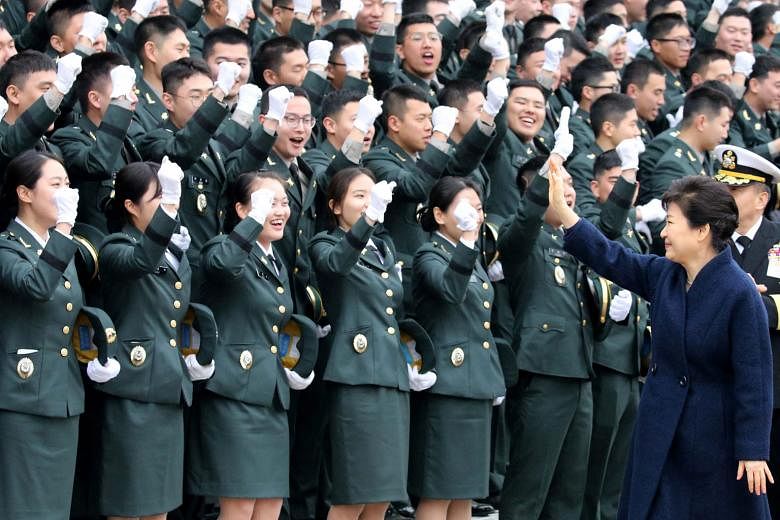South Korea and the United States have started official talks about deploying an advanced US anti-missile radar system to the Korean Peninsula to counter growing threats from the North.
The discussion about the Terminal High Altitude Area Defence (Thaad) system came amid heightened tensions as North Korean leader Kim Jong Un ordered the country's nuclear arsenal to be readied in retaliation against new sanctions imposed by the United Nations Security Council.
South Korea's Defence Ministry and the United States Forces Korea (USFK) launched a Joint Working Group yesterday morning and met for their first round of talks hours later. The group, led by the South Korean Defence Ministry's director-general Jang Kyung Soo and USFK's Major-General Robert Hedelund, would discuss the effectiveness of Thaad deployment, potential locations, timeline, cost-sharing and potential safety and environmental issues, said the ministry. It added that Thaad will "contribute to the defence of South Korea from North Korea's increasing nuclear and missile threats".
The first round of talks ended yesterday, but there were no details on whether both sides reached any outcome. The Defence Ministry, when contacted yesterday, would not give any further information.
Despite repeated assurances from Seoul and Washington that Thaad's deployment was solely aimed at deterring Pyongyang, the proposal has drawn opposition from both China and Russia, which fear that Thaad's powerful radar that can reach up to 4,000km may infringe into their military sites.
Japan is also interested in the missile defence system.
Thaad is one of the most advanced missile defence systems in the world, capable of intercepting incoming short- and medium-range ballistic missiles with a 100 per cent success rate.
Its deployment to South Korea was first raised last year, but Seoul held back from official talks due to strong protests from China, its biggest trade partner. North Korea's recent nuclear and missile tests prompted Seoul to seriously consider the system.
Chinese Foreign Ministry spokesman Hong Lei yesterday reiterated Beijing's firm opposition to Thaad, urging the parties involved to act cautiously and "not damage China's strategic security interests".
Meanwhile in Seoul, experts have speculated that Thaad may not be deployed after all, as the move would annoy China and Russia, whose cooperation is critical in implementing the latest UN sanctions against North Korea.
There was also talk that Thaad was used as a bargaining chip to get China's buy-in for the latest round of UN sanctions against Pyongyang, but assistant professor Michael Raska from the Institute of Defence and Strategic Studies at the S. Rajaratnam School of International Studies in Singapore disagreed. He said North Korea's actions have raised "serious strategic concerns" in Washington and Beijing, and both sides had to figure out how to best thwart Pyongyang's nuclear ambitions.
One way would be the deployment of Thaad on the Korean peninsula, which would strengthen South Korea's ballistic missile shield and provide another layer of defence for the nation, he added.
Meanwhile, North Korea has begun to feel the heat from the sanctions. China has blacklisted 31 boats operated by a North Korean firm and restricted the number of vehicles allowed into the North from the coastal Chinese city of Dandong.

